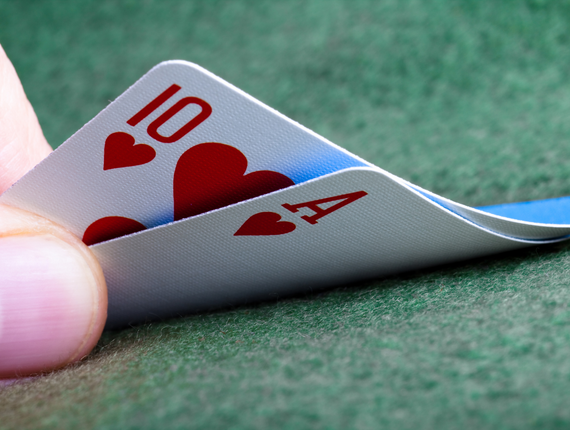
Blackjack is a popular card game in casinos and homes across the world. The game is also known as “21”. The goal of Blackjack is to beat the dealer by having a better hand than them without going over 21.
In order to play Blackjack, you will need at least two players. One player is the ‘dealer’ and the other players will be the ‘players’. The dealer deals each player two cards, face up, and then deals one card to themselves, face down. All of the players must make their decisions based solely on the value of their cards as compared to what they think the dealer’s hidden card is worth.
You can add up your score by adding up the numbers on your cards. Here’s what happens
• Ace = 1 or 11
• Two = 2
• Three = 3
• Four = 4
• Five = 5
• Six = 6
• Seven = 7
• Eight = 8
• Nine = 9
• Ten = 10
• Jack = 10
• Queen = 10
• King = 10
To get your total, you add up the value of each card. The best score you can get is 21, but if you get even one number over 21, no matter what the dealer has, your hand loses.
How Do You Play Blackjack?
The dealer begins. One 52-card deck will be offered. Live casino games often contain multiple decks, but the rules don’t alter. To prove their hand, players must gamble. You can’t change your bet after the deal starts, and your action tells the dealer you’re in.
Two face-up cards will be given to the player. They’ll give themselves two cards, one face up and one face down. The player must initiate.
Player Options:
- Hit – To get another card for free from the dealer. The player can do this as many times as they want until they go bust.
- Stand – This means the player is happy with their hand and doesn’t want any more cards.
- Double Down – Here, the player pays the amount of their original bet to buy one more card. They use the total amount in the pot to pay out any prizes. This is the only way for a player with an active hand to add more money to the pot.
- Split – This lets the player split their hand into two separate hands. They have to match the original bet, and then treat each hand as a single bet.
When the player is done making a move, the action moves to the dealer. The table rules tell them how they have to play their hand.
In general, they will need to hit on scores of 16 or less and stand on scores of 17 or more.
Player and dealer scores are compared after betting. Players win their bet if they score higher. If they tie, you win nothing and maintain your stake. They lose if they score lower than the dealer.
When a player has an Ace and a ten-value card, this is a “Blackjack.” On this hand, the dealer will pay out right away. Most odds are 3:2.
Blackjack Myths
There is a lot of bad advice out there about blackjack, and there are also some myths that need to be busted.
- Get as close to 21 as possible – This is not what the game is about. It doesn’t matter if your score is 3 or 21, you need to beat the dealer.
- Other players can influence your game – Poor strategies can sometimes help you and sometimes hurt you. The cards have already been shuffled, so you can’t change their order or make them more or less random.
- A win is “due” – When dealers go on crazy winning streaks, players think that they should have more chances to win to even things out. Not true. The mathematical edge of each hand is the same.
- Always assume 10 in the hole for the dealer – There are 31% of 10s in the deck, so it’s more likely that the dealer doesn’t have a 10 in the hole.
- Take insurance against an ace – Mathematically, in the long run, you’re better off not buying insurance against a dealer’s Ace.
- Always split tens -20 is the second-best hand you can get. If you split, you’re likely to get a worse hand and find yourself in a bad situation.
- Card counting is illegal – Nope. It’s hard and impossible to do online.
- Never go broke – People have the idea that they should stay in every hand and hope the dealer goes broke. This means standing on any card with a 12 or higher. From a mathematical point of view, this is a losing play in the long run.
Doubling Down
In blackjack, doubling down is one of the most important bets you can make. It’s the only time (other than when you split) that you can increase the amount of money in the middle.
It’s so important that it has a big impact on the house’s edge. If you don’t make the right choices when you double down, you lose those tiny house edges and put the ball back in the casino’s court.
As a quick reminder, doubling down is where you can buy your next card. You have to put in the same amount you did before, but you get one more card. After that card is dealt, you can no longer play.
When you double down, you need to pay attention to the dealer’s card. There are two kinds of hands: Hard and Soft.
- Hard Hands – This is the time to double down with hard hands. Hard hands are those that don’t include an Ace. Scenarios include:
• Hard 9 against the low card of the dealer (3-6)
• Hard 10 and 11 vs. any dealer card lower than that - Soft Hands – Here is where you should double down with soft hands. A soft hand will have an Ace, which can count as either 1 or 11, so there are really two possible hands.
• Soft 15 to 18 vs. low cards from the dealer
As we said earlier, when you double down, the table rules will come into play again. Make sure to write down what they are and how this will change as a result. Hand charts show you how to play these hands based on the rules of the table.
Blackjack Insurance
One of the easiest blackjack wagers is insurance. Don’t worry, it’s not the monthly insurance you probably pay for your car and home. Insurance in blackjack is a way to bet that protects your original bet. Still, there are a few exceptions.
Insurance is probably easiest to understand if you know that the player always bets on the dealer having a possible blackjack hand (10 value card and an ace).
On blackjack tables, a side bet can be made if the dealer has an ace before showing the second card. This is the insurance bet for blackjack. Not every blackjack table in a casino lets you make this bet, but most do. You don’t have to worry about asking because casinos that offer insurance make it clear that it’s available.
It’s important to remember that insurance in blackjack is a separate bet from the main bet. It’s a side bet with odds of 2 to 1. Whether or not an insurance bet is a good idea in blackjack depends on the cards you and the dealer have. In either case, it’s an interesting way to bet.
Blackjack’s Side Bets
Side bets are extra bets you can make during a normal hand of blackjack. These bets have nothing to do with the first bet. You have to guess what cards either you or the dealer will get.
Here are the side bets you can make when you play blackjack:
Insurance is the most prevalent blackjack side bet, as mentioned above. The dealer’s ace makes this gamble.
Side Bet Perfect Pair
Perfect Pairs – Insurance is based on the cards of the dealer, but perfect pairs are based on the cards of the player. It gives you two of a kind when you get any of the following:
- Mixed Pair (two cards of the same value, regardless of suit or color): 5:1 odds
- Coloured Pair (two cards of the same value and the same color): odds of 12:1
- Perfect Pair (two cards of the same color with the same value): 25:1 odds The payouts for perfect pair side bets depend on what the casino offers at the pay tables. It will also depend on the house edge and how many decks they will use. Between 2% and 10% is a normal range for perfect pair bets.
Side Bet 21+3
21+3: For this side bet, you base your bet on your two cards and the dealer’s up card.
- Flush (all cards of the same suit) has odds of 5:1.
- Flush (all cards of the same suit) has odds of 5:1.
- Three of a Kind (Any three same-value cards of any suit) – odds of 30: 1
- Straight Flush (four number cards of the same suit) – odds of 40:1
- Suited Triple (three of a kind of the same card) – odds of 100:1
The house edge for 21+3 bets depends on how many decks we will use when playing blackjack. Some of the above combinations can only happen if you have more than one deck. The house edge for games with four decks is 8.78%, five decks are 7.81%, six decks are 7.14%, and seven decks are 6.29%.
The gamblers’ feedback about Blackjack is generally positive. Many players find it to be an enjoyable game that can offer a lot of fun and challenge. It is easy to learn the rules and requires little strategy, making it accessible to anyone who wants to play. Additionally, there are plenty of variations on the game which make it appealing to all types of players. The odds are also favorable, making Blackjack an attractive game for experienced and novice players alike.














